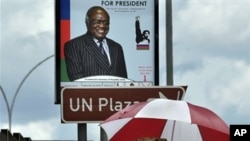In Namibia, the ruling South West Africa People's Organization is expected to win presidential and parliamentary elections, but a new opposition party is mounting a challenge. Two days of voting began Friday.
Voters in Namibia turned out in large numbers before dawn to cast their ballots. Local journalist John Grobler said many waited for hours to vote because of logistical problems.
"Voting is slow in just about all the polling stations, but especially so at the polling stations where they don't have any laptop computers to verify the potential voters on the actual roll, which means they have to go to the physical paper. And that, of course, takes time," he said.
President Hifikepunye Pohamba is running for a second five-year term. His South West Africa People's Organization, which has governed Namibia since independence nearly 20 years ago, is expected to win a two-thirds majority in parliament.
But SWAPO is being challenged by a new party, the Rally for Democracy and Progress. The RDP was formed two years ago after its leader, Hidipo Hamutenya, lost his bid to become SWAPO leader upon the retirement of Namibia's first president, Sam Nujoma.
Leticia Sakaria, a 19-year-old English student at the University of Namibia, says the government needs to address the country's pressing social ills.
"Poverty, employment, education, that's everything. I'm just disappointed by my country. It really needs to stand up," she said.
Vistorina, who preferred not to give her last name, said good governance was also an issue for her.
"There is a lot of corruption going on. The unemployment rate is too high. And poverty. So, changes should be brought to those three things," she said.
Several hundred thousand young Namibians are voting for the first time. Antonio Stefanus, a 21-year-old biology student at the University of Namibia, is one of them.
"It's an opportunity for change in our country, and in my own individual life. Because we have been living in this country, and we have never made our voice heard, so to say, at the national level. And, I feel we are currently doing that now," said Stefanus.
He is part of the generation of young Namibians called the "born-frees" because they never knew colonialism. Analysts say the advent of the born-frees has changed political discourse and obliged leaders to stop relying for votes on their role in the independence struggle.
Stefanus says young Namibians do remember the older generation's contribution to the struggle.
"We have given them our respect for what they have done for the country. Now it's high time that we divert from the past or from the notion of liberating the country onto other important things in the economy and education," he said.
Voting continues for a second day Saturday and preliminary results are expected next week.
News
Namibia Votes in Presidential Election
update
- By Scott Bobb

Election analysts say President Hifikepunye Pohamba is poised to win a second, five-year term. His ruling South West African People's Organization (SWAPO) is forecast to retain its two-thirds majority in parliament.




